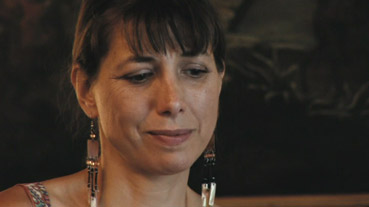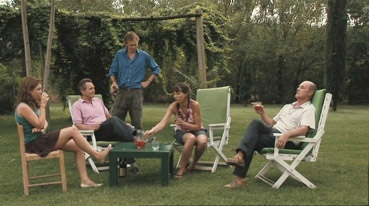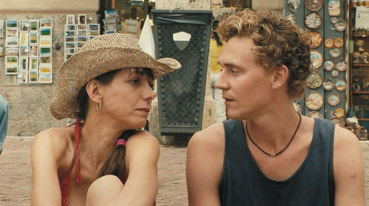|
The English abroad is something I try not to contemplate, let alone watch movies about. But I long ago learnt that you should never judge a film by its perceived content – witness Whit Stillman's Metropolitan, a smart and consistently witty work in which I fully engaged with characters I'd probably not want to share space with in real life. Unrelated, the feature debut of National Film School graduate and television director Joanna Hogg, takes place largely in a Tuscan villa inhabited by two holidaying middle-class English families, but whether it manages the same feat of character empathy appears to be very much in the tolerance of the beholder.
Central to the story is forty-something Anna, who has been invited out to Tuscany by Verena, the mother of one of two installed families and an old friend of Anna's from school days. Anna makes the journey alone because husband Alex has been tied up with work, and she soon gets into the swing of things, relaxing by the pool and joining the others for drinks and trips into town. Instead of spending time with her friend, however, she starts hanging out with the youngsters, particularly the good-looking Oakley, whose apparent interest in her and forward enquiries about her private life she is at first embarrassed by, but then finds herself responding to.

You can probably see where this is going and you'd be half-right. From the early stages, the focus is on Anna's outsider status, a woman rendered temporarily single by her husband's absence and the only one of the adults without children of her own. There are hints that she may not have been a great mixer in her teenage years (confirmed in the director's interview that accompanies the feature) and that she is quietly relishing the sense of freedom that hanging out with the younger set represents, and they seem initially happy to welcome her into their clique. That she's bottling something up is evident from the start, and that she's being inadvertently set-up for a big disappointment should surprise no-one – a holiday romance movie this ain't and films are rarely kind to older women who even contemplate involvement with younger men (Roger Michell's 2003 The Mother is a prime example, where sexual fulfillment comes at a very dangerous price). Middle-aged men who court attractive young girls are rarely so chastised, of course.
This is not a story about plot twists or character surprises, and a lot thus hangs on Anna's journey of self-exploration and her interaction with her companions. And that's where I had a problem. Quite a big one, as it happens. Now before I continue I should state up front that this is my issue and one at least partly shaped by my own life experiences and the prejudices that have grown from them. But I'm not going to be alone in this view, and with plenty of good words being said in film's praise, I'm sure one disgruntled viewer won't do it serious harm. My obstacle to involvement is, quite simply, the characters. Which ones? Well, just about all of them. Like the preppies in Metropolitan, these are not people I would want to be in the company of for more than a few minutes without wanting to slap someone, but I could say that of a good proportion of the movies I admire. Unlike the Metropolitan group, however, these guys are not just irksome, they're dull, talking a lot but saying nothing, at least nothing of interest or that even sounds interesting. This may well be realistic – and some of the exchanges are close to the sort of inane chat I have sat through when in just such company – but it doesn't exactly light up the screen or the soundtrack.
This is emphasised by Hogg's decision to shoot some sequences long and static and wide, a technique shaped by a love of the cinema of Ozu Yasujiro (who has to be the most quoted and mis-represented influence on modern European and even indie American directors), a technique that falters if what takes place in that static frame proves alienating rather than engaging. In the accompanying interview, Hogg states that British cinema doesn't have a tradition of exploring the middle-class milieu and she's right about that, but on the evidence here it's not hard to see why, or why such characters are more often the subject of satire or negative social commentary. The character establishment scenes, which run for the first third of the film, certainly have a naturalistic and observational feel, but have none of the wit or banter such sequences cry out for or, indeed, that you might expect to hear in real life. It's interesting that some observers have concluded that Hogg's intention was to make a film exposing the ghastliness of the English middle classes – I seriously doubt was ever her intention, but there were moments in that first third when I began wishing those kids from Eden Lake would show up and give Oakley and his chums something to really complain about.

That said, individual scenes are still effectively handled, particularly once we're past the halfway mark and have got to know – if not like or connect with – the assembled group. A flaming row between Oakley and his father is made far more unsettling by having it take place out of view and by focussing instead on the where-to-look embarrassment of the poolside group who sit awkwardly within earshot. There can be few watching this who have not at one point found themselves in a similar situation, and a degree of empathy is assured that simply would not have been there if we had witnessed the fight. Similarly, once Anna starts to feel isolated from both the older and younger groups, her awkward sense of being an uninvolved outsider is effectively communicated if occasionally overstated – having the two groups walk separately down a road followed at a safe distance by the solitary figure of Anna feels a little like spelling things out for the slower audience members, but it still carries a ring of truth that once again plays on an experience many will recognise and respond to. And while Anna's late-film revelation to Verena about what's really bugging her may not be the big surprise it's been built up to be, its gravity to Anna is still effectively estabished through actress Kathryn Worth's most convincingly expressed despair, although this is undermined a little but the too-neat emotional wrapping-up that follows in order to provide just about everyone with a potentially positive way forward.
Many have clearly not reacted as I have to the characters or the handling of the story, and a lot will depend of your experience and tolerance of this particular social group, who receive accurate enough portrayal here for those who liberally use the word 'darling' and kiss each other on both cheeks (I'm not piss taking – it's in the film) to not feel misrepresented. This does also mean, though, that if you've ever found yourself in such company and dreamed of having a Kalashnikov and a full clip to hand, then you're likely to find that trigger finger itching before the first twenty minutes are over. As I said, it's my prejudice and thus my gut reaction, but if it's one you even suspect yourself of sharing then be warned. Even putting all that aside, though, I was left a little unsure what I was meant to take away from the experience, save for the suggestion that if you have a deep-rooted anxiety then just telling someone about it will make everything seem alright – people will like you again, you'll be happier in yourself, and even that guy on the end of the phone you've been arguing with will put a cheery smile on your face. Oh, if only life was like that.
A low budget film that has benefited from newer low-cost technology, Unrelated was shot on a Sony Z1 HD camcorder (a machine I am very familiar with), a low-end but perfectly serviceable high-def camcorder whose image has transferred rather well to DVD. The anamorphic 1.78:1 picture is generally crisp and the contrast and colour good, although the black levels do tend to grey out in the darker scenes.

Dolby 2.0 stereo and 5.1 surround tracks are both available but there's generally little to choose between them, save for the occasional effect that brings the rears momentarily to life (Anna jogging past the camera). There's no score to speak of (diegetic music doesn't really count), but the dialogue is clear when it's designed to be – there are occasional shots where we watch but not hear characters talk from a distance, which actually works rather well.
Interview with Joanna Hogg (25:38)
A straightforward but useful interview with the director that covers much of the expected ground, including how she got into filmmaking, how the story was shaped by her own experiences, the cast, the underlying themes, the Ozu influence, the technical aspects and her next project, which will apparently be a development on the characters and themes here. One to look forward to, then.
I appear to be in a minority on this one, and such is often the way when it comes to personal taste, but with a story this slight, a lot rides on your engagement with the characters, and in my case it just didn't happen. There's still some good stuff here in the filmmaking – the Japanese cinema influence extends beyond Ozu, particularly in the minimalist editing – and every now and then I came close to connecting with Anna's experience, particularly her later discomfort in the company of this lot. A decent enough DVD, though, so if the movie's for you then the disc should do fine.
|